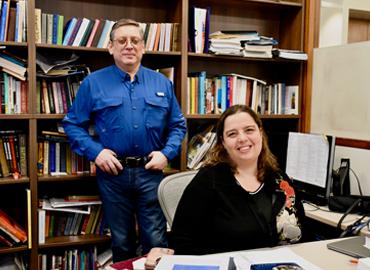
CERES faculty Anna Shternshis has sourced SSHRC funding to help scholars from Ukraine
When historian Igor Shchupak fled his hometown of Dnipro shortly after the Russian invasion of Ukraine in February of last year, he could take very little with him. But he did remember his laptop.
Anna Shternshis understood this perfectly. “He’s a scholar like me. And I’m thinking, if I had to run? That’s what I’d take too.”
Shchupak’s computer contained priceless historical testimony and archival material gathered from Ukrainian eyewitnesses to the Holocaust; now, safe in Toronto, he is transcribing his findings with a view to publishing them.
He’s one of several scholars who are now pursuing postdoctoral or graduate studies at U of T, thanks to emergency funding from the federal government’s Social Sciences & Humanities Research Council (SSHRC) — and to the efforts of his colleague Shternshis, Al and Malka Green Professor of Yiddish Studies and director of the Anne Tanenbaum Centre for Jewish Studies in the Faculty of Arts & Science.

“I’ve known Igor for a while, because we work in a similar field,” says Shternshis. “When he arrived in Toronto and needed help, I thought: what can I do?”
After combing Google for options, she was alerted to the SSHRC program by colleague Martin Pickavé, chair of the Department of Philosophy. It allows any SSHRC-funded professor to supervise the research of a Ukrainian scholar for one year. “The second I found out about it, I filled that form. Ten days later the permission came, and we were able to hire Igor as a postdoctoral fellow.”
Shternshis knew that many other scholars from Ukraine had also sought refuge in Toronto, and that they too could benefit.
“I’m a specialist in refugee studies and the Holocaust. I know that if a refugee finds a network of people who can help, or even one person, that can make a huge difference in how their life trajectory works out,” she says.
Shternshis contacted refugee scholars in an online community, asking them to approach her if they needed help finding placements. Flooded with requests, she then set about playing matchmaker. Communicating in Russian — her first language, and one that is easier for Ukrainians than English — she helped the scholars find professors on staff working in similar veins to their own. So far, she has placed a handful of scholars with expertise in areas as varied as history, the study of religion, philosophy, Slavic studies, river biology and others..”
“The goodwill on the part of faculty members was tremendous,” she says. “And most importantly, academia is not losing these scholars, it’s keeping them. That’s very exciting.”

